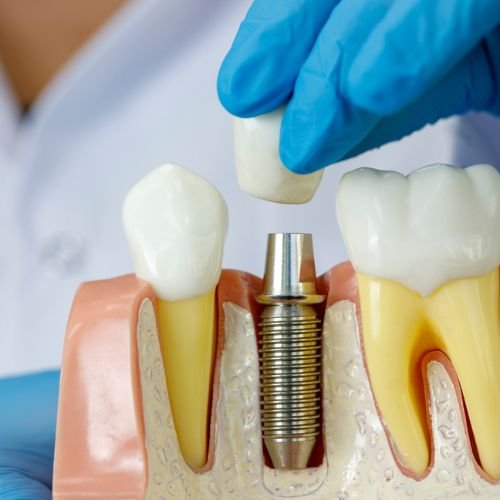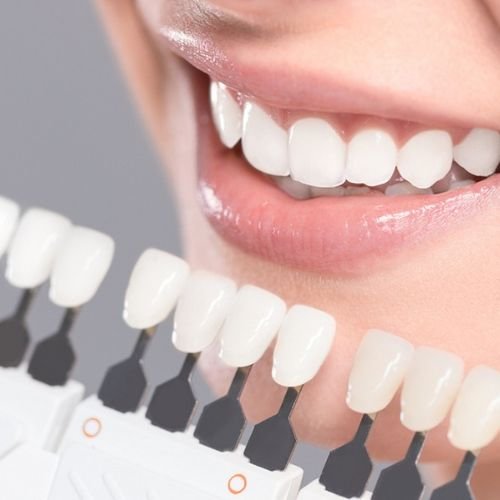Everyone wants to have a beautiful smile. However, not all people consider their smiles beautiful because of their teeth. If you’re not happy with your teeth’s appearance, dental veneers may be the solution for you. Dental veneers are a popular way to address several cosmetic dental problems at once.
If you’re interested in getting dental veneers, this guide will tell you everything you need to know about the procedure. We’ll discuss veneers, their application, and what you can expect from the process. Keep reading to learn more!
What Are Dental Veneers?

Dental veneer treatment is a cosmetic dentistry procedure that improves the appearance of your teeth. Veneers are thin, custom-made shells designed to cover the front surface of teeth. Veneers are ideal for patients who want to improve the look of their smile and correct cosmetic dental concerns such as:
- Broken Teeth
- Chipped Teeth
- Crooked Teeth
- Discoloured Teeth
- Gaps Between Teeth
- Irregularly-shaped teeth
- Misaligned Teeth
- Misshapen Teeth
- Uneven Teeth
- Worn Down Teeth
How Do Dentists Apply Dental Veneers?

There are three types of veneers: porcelain, composite, and temporary. Porcelain and composite veneers are bonded to the teeth, making them fixed and not removable.
Let’s go over the application process for each type of dental veneer.
Porcelain Veneers
Placement of porcelain veneers involves the following steps:
- Your dentist will remove some enamel from the front and sides of your teeth to make room for the veneer.
- Your dentist will take a mould, or an impression, of your prepared teeth using an impression material or a digital scanner.
- Together with your dentist, you will choose a veneer shade that suits your smile.
- The impression taken will be sent to the dental laboratory to create a tooth model from which the porcelain veneer will be custom-made. This process can take several weeks. In the meantime, your dentist will prepare temporary veneers for you to wear until the procedure is complete. Once the porcelain veneers are ready, you will be called to come back for cementation.
- Your dentist will remove the temporary veneers on your next visit. The final veneers will then be placed on your teeth for trial fitting so you can check how well they fit and look.
- Once checked, your dentist will remove the veneers to allow teeth cleaning. Afterwards, the veneers will be bonded to your teeth using bonding cement.
Composite Veneers
For composite resin veneers, your dentist begins by thoroughly cleaning your teeth to prepare them for veneer application. Your dentist may or may not need to remove a thin layer of enamel as tooth preparation.
There are two types of composite veneers, direct and indirect veneers. Direct veneers are moulded directly onto the patient’s teeth inside the mouth, while indirect veneers are fabricated using a model of the patient’s teeth outside their mouth.
Direct Veneers
- Before applying direct veneers, your dentist will apply a conditioning gel on the surface of your teeth. This will be left on the tooth for 15 to 30 seconds and then rinsed off with water.
- After drying the tooth, a bonding solution will be applied to the tooth, and a light will be shone on the tooth to allow the composite to stick to the tooth.
- Thin layers of composite material will be placed on the tooth surfaces. This will be contoured and shaped based on the desired appearance.
- After ensuring that the composite is shaped well, a light will be shone on the tooth again to allow the composite to harden.
Indirect Veneers
- After reducing the enamel on the tooth, an impression of the tooth will be taken using an impression material or a digital scanner.
- A model of the patient’s teeth will be made using the impression, and this will be sent to the laboratory to be used as a mould from which the veneer will be fabricated.
- The indirect composite veneer will be returned to the dentist. The teeth will be conditioned and prepared the same way the tooth is prepared when placing a direct composite veneer.
- The indirect composite veneer will be placed on the tooth and hardened with a special light.
- Lastly, the indirect composite veneer must be polished to blend in with the rest of your teeth.
Temporary Veneers
Applying temporary veneers is a simple process that can be completed in just a few minutes.
- First, the teeth must be cleaned and dried.
- Next, a thin layer of adhesive is applied on the front surface of the teeth.
- The temporary veneers are then placed on the teeth and pressed into place.
- Finally, any excess adhesive is removed, and the temporary veneers are left to set. Once the adhesive has set, the temporary veneers will provide a natural-looking finish.
Temporary veneers are used to cover the teeth while the porcelain and composite veneers are still being fabricated.
Can I Pick the Shade of My Dental Veneers?

Choosing the right shade of your dental veneer is one of the most important decisions you’ll make when getting this treatment. The good news is that you have a lot of control over the final look of your veneers.
Your dentist will work with you to choose a shade that looks natural and complements your other teeth. If you are looking for a very natural look, your dentist will choose a shade that closely resembles the colour of your natural teeth. If you want a brighter smile, they will help you choose a whiter shade. If you’re not sure what shade you want, you can ask to see samples or get dental veneers in a temporary shade before deciding. With so many options available, there’s no reason not to love your new, beautiful smile.
Does Getting Veneers Hurt?
Many people are interested in getting veneers but are concerned about whether or not they will be painful. The good news is that veneers are generally not painful, and most people report feeling only minor discomfort during the procedure. This is because veneers are placed over the front surface of the teeth, and the nerves that sense pain are located further back in the tooth.
Placement of the veneer does not usually require anesthesia. However, if the patient is experiencing tooth sensitivity, the administration of anesthesia might be considered to make the patient feel more comfortable. In some rare cases, sensitivity might be felt after veneer placement. Over-the-counter pain medications can be taken to alleviate this. Overall, getting veneers is a relatively quick and painless way to improve your smile.
What Are the Possible Risks During the Dental Veneers Procedure?
Dental veneer treatment is generally safe and effective, but like all dental procedures, it still involves some risks. These include:
Chipping or cracking of veneers
While porcelain veneers are strong and durable, they can still chip or crack if you bite down on hard objects or if you accidentally fall.
Gum irritation
Signs of gum irritation include redness, swelling, and bleeding. This may result from the bonding agent used to attach the veneers to your teeth. If this gum irritation persists, it could result in gum recession.
Gum recession
Gum recession and gum shrinkage can happen when the gum tissue around your teeth starts to pull away from the tooth surface. This can happen because of improper placement of the veneers or because of gum irritation.
Teeth sensitivity
This can occur when the veneers come into contact with the nerve endings of the teeth because of aggressive tooth preparation, causing discomfort or pain. If this persists, inform your dentist immediately.
Tooth decay
Tooth decay can occur if any food or bacteria gets trapped between the veneer and your natural tooth. This can cause the veneer to become loose and eventually fall off.
Overall, dental veneers are a safe and effective way to improve the appearance of your smile. However, it’s important to be aware of the potential risks before undergoing any dental procedure.
Take the first steps toward your perfect smile today!
Or Call Us : (08) 6495 4004
Tips on Aftercare for Your Veneers

Once dental veneers are installed, you’ll want to take good care of them to ensure that they last as long as possible. Here are a few aftercare tips:
- Avoid chewing on hard objects and chewy foods, as this can damage the veneers.
- Although porcelain veneers are designed to be stain-resistant, you still need to be mindful of what you eat and drink, as dark-coloured beverages and foods can cause stains.
- Brush and floss regularly to maintain good oral health.
- See your dentist for a follow-up visit, regular checkups, and cleanings.
By following these simple tips, you can help ensure that your dental veneers will stay in good shape for years to come.
Can You Undergo Teeth Whitening with Dental Veneers?
Veneers cannot be whitened with professional whitening treatments. While teeth whitening will not change the shade of veneers, they may change the shade of your natural teeth, possibly causing an uneven shade of your smile.
How Much Do Veneers Cost in Australia?
The cost of dental veneers in Australia can vary depending on several factors, including the type of veneer used, the number of veneers required, and the dental practice you visit. Porcelain veneers tend to be more expensive than composite veneers, but they offer a more natural-looking result than the latter.
Generally, you can expect to pay between $400 and $1,500 per tooth for dental veneers in Australia. However, some dental practices may offer discounts for multiple veneers, so it is always worth asking about pricing options before deciding.
Dental veneers are self-investments, and they can last for many years with proper care. To ensure its longevity, it is important to choose a reputable dentist who can provide high-quality results.
Final Thoughts
Dental veneer application is a multi-step process. Depending on the type of veneer you choose, the process can take anywhere from one to two appointments over several weeks.
If you’re considering dental veneers as an option to improve your smile, talk to an experienced dentist from South Lake Smiles today. We are dedicated to providing our patients with the highest quality dental care.
Our team of experienced professionals can walk you through the entire process and answer any questions you may have. Plus, we always strive to provide a relaxing and comfortable experience for our patients from start to finish.
If you are considering dental veneers, please book an online appointment or call us at (08) 6495 4004, and we would be happy to discuss your options with you.







